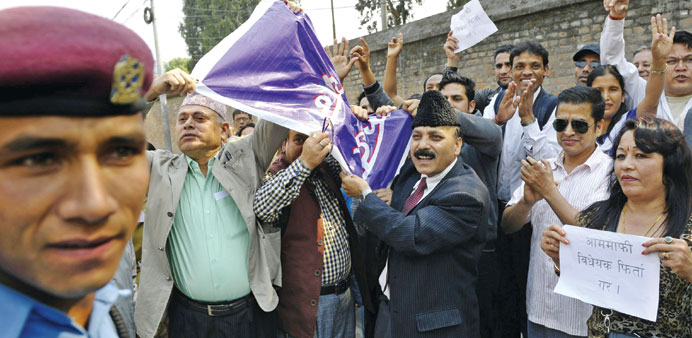|
Nepal’s government faced calls yesterday from human rights and victims’ groups not to grant amnesties over atrocities committed during the country’s civil war for which nobody has been brought to justice. |
Wedged between China and India, the nascent republic suffered a decade-long insurgency that pitted Maoist guerrillas against the army. More than 16,000 people died, hundreds disappeared and thousands were forced out of their homes.
Eight years after the conflict ended, the new government has proposed the amnesties as part of legislation to establish a reconciliation process modelled on the approach taken by
post-apartheid South Africa.
“We want the government to change the draft and ensure that those who committed serious crimes during the conflict are not given an amnesty,” said Janak Bahadur, who says he was tortured by the security forces during the conflict.
Bahadur, head of the Conflict Victims’ Society for Justice, said that the planned bill ran counter to a Supreme Court decision and did not conform with
international standards.
“We’ll press lawmakers against it and urge them to bring necessary amendments before it is approved,” he said, adding the victims could seek redress at the Supreme Court.
Both the security forces and the Maoist rebels committed widespread atrocities during the insurgency, human rights groups say, yet no one has been punished or tried in a civilian court.
Nepal’s new centre-left coalition government on Wednesday proposed legislation to set up a Truth and Reconciliation Commission and a Commission on Disappeared persons to give justice to war victims and heal the wounds left by the conflict.
A similar bill drafted by a previous Maoist-led government was rejected by the Supreme Court in January because it gave amnesty power to the
commission.
Law Minister Narahari Acharya told reporters on Thursday there was no blanket amnesty plan in the draft legislation and any pardons would require the consent of victims.
Human rights lawyer Govinda Sharma Bandi, who heads the transitional justice unit at Nepal’s Bar Association, said the commission could recommend amnesty for serious crimes: “It is very tactfully drafted to avoid
accountability,” he said.
On Thursday, 20 conflict victims and rights activists were detained for two hours after they protested against the plan outside a complex that houses the prime minister’s office.
The parents of a teenage boy who was allegedly killed by the Maoists during the conflict are on a fast-on-to-death protest demanding that the killers be
arrested.
The United Nations human rights agency has called for truth and reconciliation efforts to meet international standards and said serious abuses should not be left unpunished.
London-based human rights group Amnesty International says the new government elected in February had an opportunity to correct the history of lack of accountability for war crimes.
The truth panel is a major condition in the peace deal that brought the Maoists into the political mainstream. But it has not been formed because of a row among political parties over who should qualify for an amnesty.

